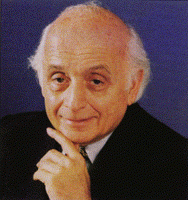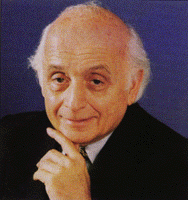
A Reform Judaism of substance is a life path that links the past to the future through the wilderness of our lives.
Our lives are a wilderness, uncharted and unpredictable - untimely deaths, unexpected blows, unsuitable matches, unfulfilled dreams.
And yet, by gathering our heartaches into a house of worship, we find something transformative happening - our sorrows become windows of compassion.
Paths through the wilderness, hewed and marked by past generations, give us our bearings. Patterns of meaning and significance emerge. We are moved from self-pity to love. Our individual heartbeats merge with the pulse of all humankind. Suddenly we no longer tremble like an uprooted reed.
The synagogue is the regenerative soil of Jewish life. Just beneath its statuesque surface, our roots densely intertwine.
Like giant redwoods, standing shoulder to shoulder in ever shrinking forests, we Jews share a reality of interdependence, holding one another up.
Nowhere is this reality more strikingly revealed than in our congregations, our houses of gathering. Bialik called the synagogue "the mystic fount... the treasure of our soul." The Talmud called it the place "where heaven and earth kiss," The Zohar: "an earthly copy of the heavenly original." I simply call it home.
Like any home of any size, the synagogue needs upkeep, renovation and innovation. The human dynamics within our congregational homes need refreshment and renewal.
Like any family, we suffer from the dissonance between expectation and reality. We hope for intimacy and spiritual engagement but often receive awkwardness and uncertainty. We hope for exaltation but often receive habit. We hope for support but often receive rejection.
My fellow Reform Jews, abandon the noncommittal stance too many have toward temple life. Perhaps we are so intimidated by Judaism's prerequisites, so ashamed of our ignorance, so loathe to feel helpless or lonely or foolish, that before our mortification can surrender to awe, we have gone through that revolving door.
Thus, I urge you: Hold your ground! Be steadfast! Learn to make patience and humility your first spiritual discipline. Learn to make awkwardness and discomfort your first spiritual achievement.
It was not with a literate, Jewishly proud people that God made the Covenant at Sinai. It was with freed slaves, addicts of the fleshpots of Egypt, people too frightened to receive God's message directly - "lest we die," they said. Still, the Covenant was sealed.
Let us be inspired by these ancestors to renew the Covenant - inspired not by their special virtues, but by their human flaws, flaws that make their hearts vulnerable to God's touch.
Let us overcome the arrogance that blocks our perception of Divinity. Let us overcome the fear that induces us to flee from synagogue and spiritual commitment.
For us there is one place for this spiritual work: It is the synagogue. For in this place, if we stand and pray, the Jerusalem Talmud tells us, "the Holy One listens," "even as a friend in whose ear one whispers a secret."
The Holy One does not communicate only in private, or in whispered exchanges. God speaks in dreams to Jacob, in thunder and shofar blasts to the whole people, and one-to-one with Noah. Yet the sign of the Covenant is a rainbow, for all future generations to behold.
How much easier it is to avoid God's call. With the sword of Damocles in constant suspension overhead, who dares even look up to glimpse God's ladder? We have worries enough to preoccupy us: monies to be earned and homes to be renovated, children to be supervised and careers to be cultivated. The soothing opiate of post-modern cynicism is at hand, ready to be seized and inhaled.
Hear God's call. Jacob did so in a dream, And he took the stone that had been his pillow and made of it an altar, and he anointed the place Bethel: the house of God.
Unbeknownst to Jacob, it was the very place where his grandfather Abraham had built an altar and "invoked the Lord by name." Unbeknownst to him, it was the very place where he would return after years of indenture to be renamed Israel from whom would spring "an assembly of nations."
So it is with our community: We have together built this most dynamic Jewish movement atop the many levels of the Jewish past, and as a gateway into the Jewish future. We have done so by returning from our separate journeys, again and again, to our togetherness, to the place that is God.
Together we have made of Jacob's stone a circle of stones ringing the world.
It is my joy, now, to step out of the center of that circle. My sojourn at Bethel is complete. It is my honor, now, to surrender that hard pillow of leadership. Younger heads are ready to dream their dreams upon it.
God willing, the ladder will be lowered to me and my dear wife Rhea wherever the years may take us... that we may ascend and descend and dance with the angels.
Adapted from Rabbi Schindler's farewell address at the UAHC biennial in Atlanta on December 2, 1995


